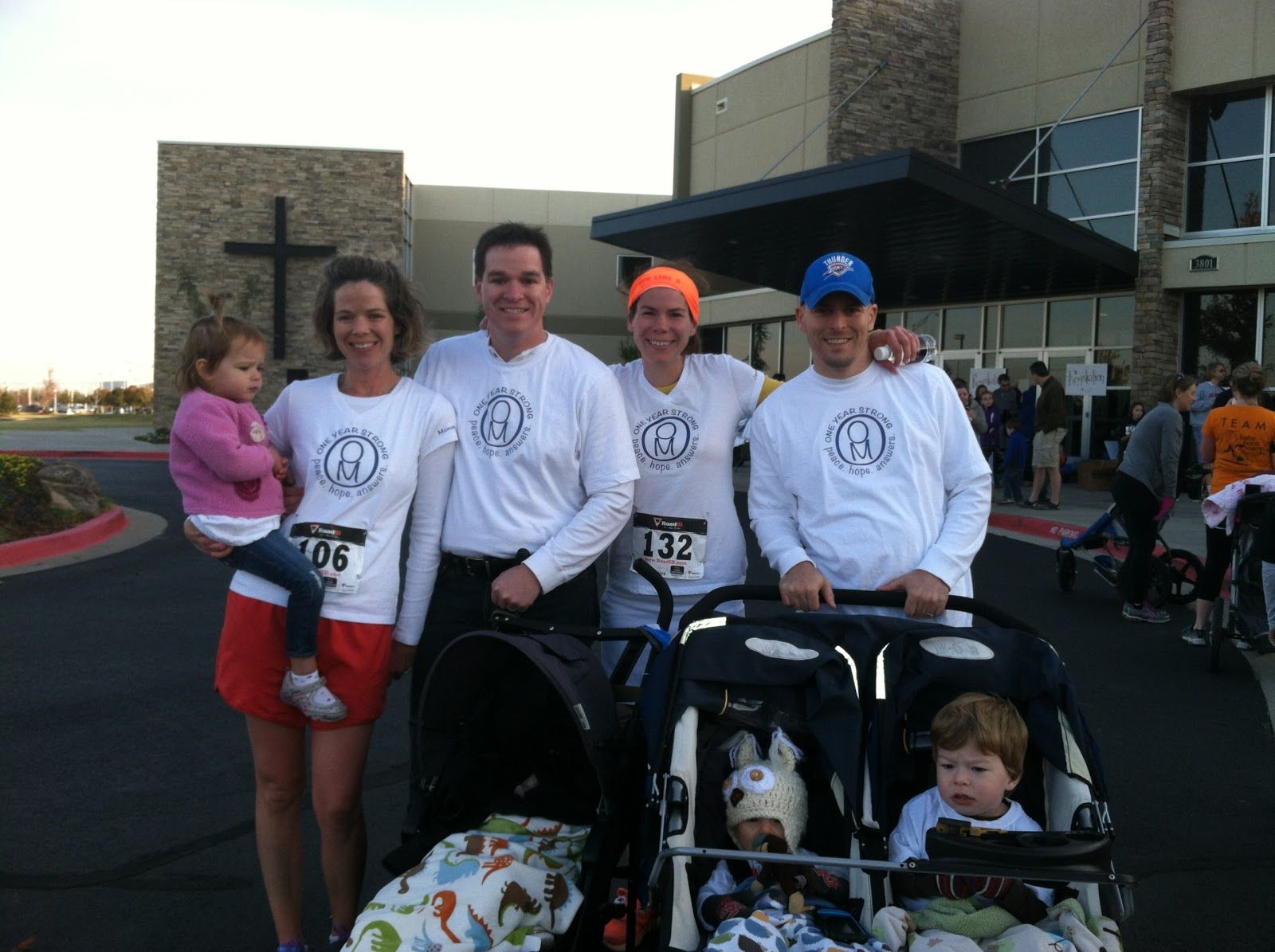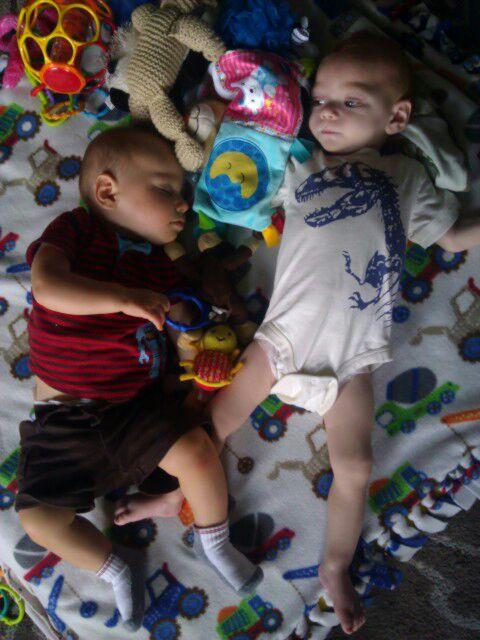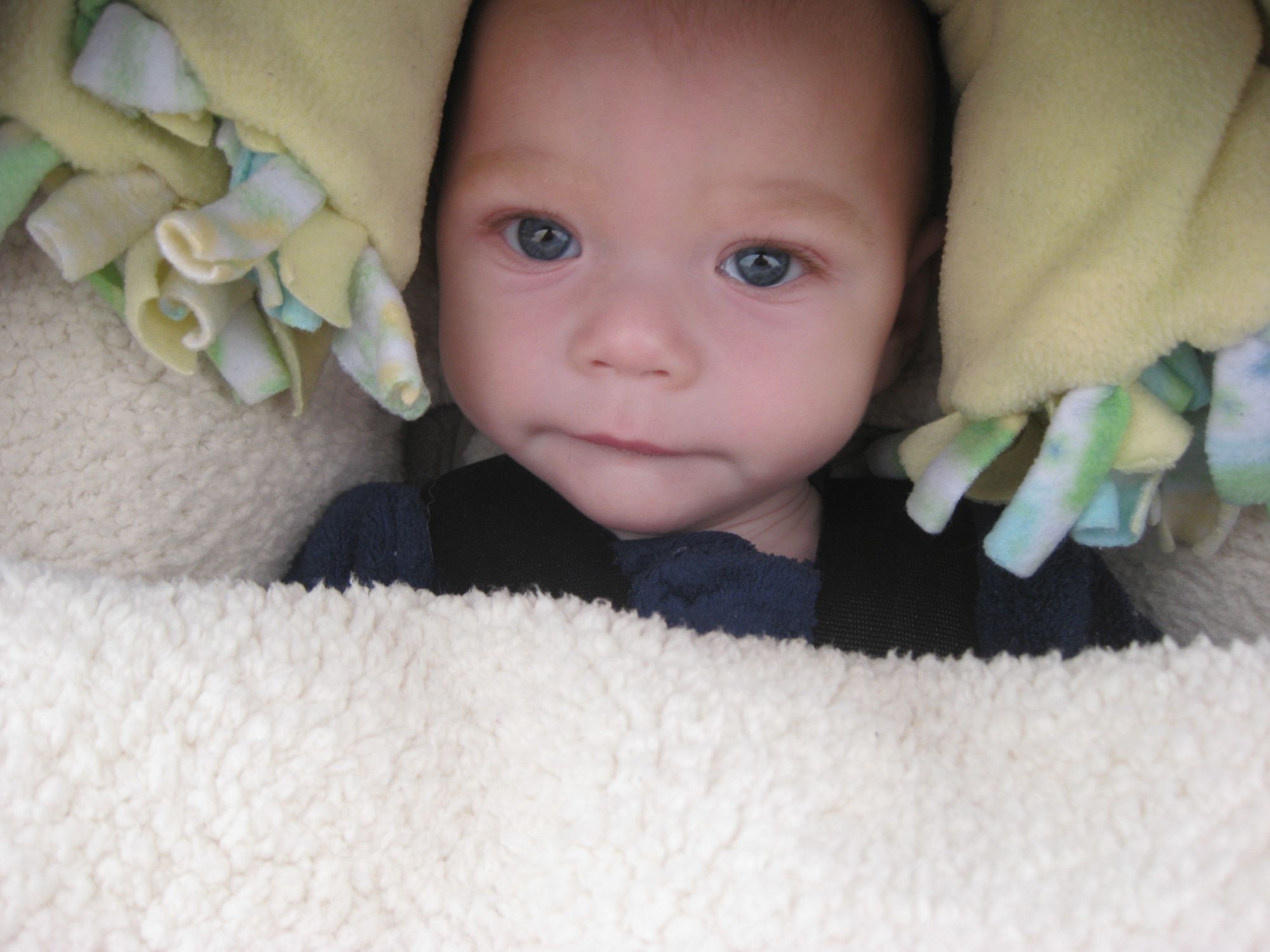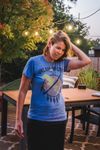7. redheaded epiphany

I once loved a little boy named Owen. I loved him from his first breath to his last, and I loved him for a million little seconds in between. I have never known how to talk about Owen’s death, so I mostly don’t. Trauma wrapped its claws around every last one of us in a dark room that early morning years ago, and my mind-- for its own protection-- does not venture back to it often. When I do reflect, I can see my silence surrounding it is normal. On her album folklore, Taylor Swift wrote a song called “epiphany,” which she explained is about events that happen in life that are so terrible, we cannot formulate words for them. “But you dream of some epiphany...to make some sense of what you’ve seen,” Swift sings. The October morning that Owen died is the scene of my “epiphany.”
The first time I ever held Owen, a year and a half before he died, it felt like both a beginning and an end. He was tiny and sleeping, red curls sprouting from atop a head with a furrowed brow. I put my lips close to his ear and murmured,
“Wynken, Blynken, and Nod one night sailed off in a wooden shoe--
Sailed on a river of crystal light, into a sea of dew.”
Owen’s face flickered as the knot in my throat grew. Earlier this year, I was almost sure I would never get to kiss his face.
I remembered the day, just four months before I first held Owen, that my husband BJ and I received the email that began and ended it all. It was entitled simply, “Owen.” Too broken by her devastating news to speak it aloud, my closest friend Sommer had composed a message about her baby and disseminated it to a small group of recipients. The lives of every name on the list shattered that day as we each read the news: a routine two-month checkup had taken a horrible turn. After realizing Owen was probably blind, doctors admitted him to the hospital for related testing. He had been in a lot of pain the first two months of life, but it was previously thought to be reflux issues. Now, doctors believed that Sommer and Pete’s infant son Owen had a “devastating and life-limiting condition.”
My mind was reeling as I read the email. How could this be possible? Still in denial, my thoughts turned to summer vacation just a few months before, when our families played on a New Hampshire beach together. Sommer and I were both pregnant, laughing aloud at our one-year-olds as they explored the surf and smeared wet sand onto each other’s arms. We never saw this-- whatever this is-- coming. How could we have? And yet, I felt a wave of foolishness wash over me as if I should have known that something was grievously amiss.
I spent the next couple of days in a cold sweat of sorrow; my ignorance about what exactly was going on in Sommer’s life consumed me, but I didn’t want to pry. Instead, I sent encouraging texts (“The Potters heart the Marshalls!”) and waited until she called. I didn’t have to wait long. A few days after the foreboding email, she called me on my commute to work. I pulled into the parking lot and left the engine idling as I listened. I could tell she had had a couple of days to digest the news, because she spoke with few tears.
“Owen has some form of leukodystrophy. Doctors think maybe Krabbe disease,” she calmly told me. “We’re waiting on tests.” My mouth fell open in shock; she need not say much more. I’m a psychologist with an armload of neurobiological classes under my belt. By strange coincidence, I had selected leukodystrophy as the topic of an extensive research paper just two years before, and I knew what it meant, especially at Owen's age: an abnormality of white matter in the brain, an unraveling of the myelin sheaths that insulate precious nerve cells, a horrifying condition that results in death at an early age. In the course of one brief meeting with a team of Boston physicians, Sommer and Pete had gone from thinking their baby had acid reflux to realizing he would not reach childhood. It was an agonizing reality to bear.
BJ and I took the news terribly. Until now, crippling pain had always felt far-off, something we read about on glowing screens before turning our phones to sleep mode. This time, there was almost no distance. The lightning strike was in our own backyard. My closest friend’s son was dying of an exceedingly rare brain disease? Who says this? We were grappling with an unimaginable truth.
Over the past few years, our family’s threads had woven together with the Marshalls, growing in tandem like a pea plant that entwines with neighboring forsythia. Sommer and I had shared the joys of our first pregnancies, delivering babies four days apart-- and then became ever closer as our babies transformed into toddlers before our eyes. We were exhausted, but we loved it. Eager for more punishment, we both quickly became pregnant again, our second pregnancies overlapping in our continued glee. In the wake of the Marshalls’ tragedy, BJ and I both cried daily for at least a month, hugging our only son tightly at regular intervals. We resolved that we would make the trip as a family to Massachusetts as soon as our baby George was born, and I would travel additionally with babies so that we could all see Owen at least twice a year, hopefully more-- always wondering if each goodbye would be the last.
Care packages, daily texts, and phone calls seemed like pitifully inadequate means of reaching out in the wake of such catastrophe. Daily, I felt as though my best friend was getting the living daylights kicked out of her in a dark, locked closet, and I was helpless on the outside. All I could do was lean my tear-streaked cheek against the door and scream.
“I don’t think I can ever be happy again,” she forlornly mused.
“I’m here!” I would howl. “I’m here and I love you! I’ll never leave you, no matter how hard!” I hoped my voice reached her ears as she faced a beast that methodically plucked away every shred of joy she knew. And so I cried and I screamed for two years.
By the time I met Owen for the first time in early April 2012, doctors had found a pharmaceutical cocktail to relieve some of his neurologic agitation. Owen was seven months old and my son George had just turned ten weeks (though it felt hideous for me to not meet Owen straight after his diagnosis in November, my obstetrician had advised me to not travel late in my pregnancy). Our families spent a cherished five days together, playing at playgrounds on beaches under grey skies, consuming large quantities of iced coffees, and cuddling babies. Because Owen could not see books, I had memorized a few to whisper in his ear. During our visit, Sommer played songs from Sesame Street on loop for the kids. To this day when I hear the tune of “Sing-- sing a song!” I taste brownies and yellow, salty grief at the back of my throat.
For the next year and a half, our families laughed, cried, and experienced life together. Despite a 1,746 mile distance between our homes, we were often within reach, seeing new places and tackling new challenges. We watched the ships at Rockport, visited zoos and museums, and trick-or-treated on Halloween night. Owen even traveled to our home in Oklahoma on the one-year anniversary of the awful email. During our time together that weekend, Sommer and I ran a five-kilometer race in white shirts designed by Pete (“One Year Strong: Peace, Hope, Answers,” they read); we crossed the finish line high on emotion, holding hands and reflecting on all that the past year had flung. That day, like so many others in that time period, felt like mining for gems: I hunched and labored in a cold, pitch-black cave with no guide, ill-equipped, and miserable with the anticipation of a total collapse at any moment. But sometimes, rarely, I triumphantly excavated diamonds.

Days before Owen’s second birthday, Pete and Sommer met BJ and me for a long weekend in New York City, where we laughed endlessly at Kama Sutra wallpaper in a hidden speakeasy BJ had found (can humans really bend like that?), and strolled through Central Park on sunny days. I was pregnant again, and Owen was hanging on, though life was incredibly tough with significant seizures, respiratory distress, profound irritability, and round-the-clock needs. Each time we thought it was the end, Owen pulled through and it all became a new beginning. “That O-ster! Our turkey tricked us again!” Sommer would chuckle. Owen’s disease was an extreme rarity; doctors had never been able to give Sommer and Pete a parameter for his life expectancy, in part because even his geneticists never discovered exactly what was going on with Owen, except to say that it wouldn’t be long. The end felt always around the corner, but it never showed itself even as we all braced for it.

Far too quickly, the end came. For a week or two, Owen stopped showing signs of his previous functioning. Though he never gained skills like sitting, speaking, or feeding himself, his unwillingness to engage or even digest food had become apparent. Puzzled, Sommer called on Owen’s palliative care physician, Dr. K, who came for a home visit.
“He’s telling you it’s time,” she gently told Pete and Sommer. “I think it’s time to ramp up his comfort levels and bring in hospice.” Dr. K had been there from the beginning, a trusted voice of reason in an insane reality. They calmly agreed with her, amazed they had not seen it for themselves any sooner.
“I can be there in two days,” I told Sommer on the phone when she called me with the news.
“I hadn’t even considered you would actually come. But, yes, we want you here. Please come-- we can use you,” she sighed, totally spent. Arrangements were made for Pete to pick me up at the airport in Boston. It was perhaps our shortest time ever between visits, as we had been laughing in New York less than two months before.
“This time,” I told my obstetrician, “I’m not messing around. Thirty-three weeks pregnant or not, I have to go. I can’t stay home.”
“You always have your big ideas, don’t you, Dr. Potter?” Dr. Brown mused wryly. He agreed I could go, as my condition wasn’t risky.
I arrived on an October Sunday at what felt like chaos: lots of visitors in the small living room, one of whom was in the rocker, holding Owen to his genuine unhappiness. Two nurses were bustling, clergy and extended family had come to visit Owen, and I was uncomfortable with a large belly after a long flight. Sommer didn’t have to observe this situation for long to realize it was too much: Owen needed to be laid into his bed and held no longer. This is exactly what he seemed to prefer, and that is where he remained over the next few days. We held vigil by the giant bean-bag bed in the dining room, table shoved aside as a medicine cabinet/nurse workstation. We took turns sitting on Owen’s bed with him, looking out the window toward Clinton Street, where the autumn leaves were brilliantly red and falling.
“It doesn’t even make any sense,” I told Sommer’s mother Marylou, whom I had come to know fairly well over the years. “How can it be so beautiful out there? He should be playing in those leaves! It’s like the world doesn’t even know.” Marylou agreed.
We all took shifts with Owen that last week, and there was always a hospice nurse present. Even in the middle of the night, I loved being with him.
“And you shall see the beautiful things as you rock in the misty sea,
Where the old shoe rocked the fishermen three: Wynken, Blynken, and Nod,”
I whispered into his face. “Owen, your mom and dad said you can go now. You can go be free!” I breathed in his red curls, often watching his throat for breathing movements. Aspiration was a very real fear, as his breathing was erratic and loud. Sometimes he paused for 20 seconds and I stopped breathing too, resigned to the end, before he fooled me by inhaling noisily. “It’s okay, buddy. Go run on your legs! Go see what ice cream tastes like,” I murmured. “It's your mom’s favorite. You’ll love it.”
On the day Owen died, we were up long before the sun. Marylou and I agreed that iced coffees and donuts were going to be the only way the rest of us survived the day. Our souls and brains were fried, mangled by the back-and-forth of life and death that had not ceased for two years; a short respite to gather sugar and caffeine promised the gasp of sanity I needed. As she drove, I absorbed what felt like a foreign scene around me in the passing streets. The sunlight was too bright, the day far too normal-looking. It felt like every person out there should know that we were enduring real-life hell back on Clinton Street while they commuted to work and went for their morning jogs.
Back home with coffees in hand, we all converged in a five-minute meeting in the kitchen to discuss the plan for the day. I looked at the faces around me; along with the exhaustion, I could see determination and resilience. For the first time in a week, I could sense some kind of strange beginning. We were going to be dragged into it kicking and screaming, but we would not keep it from happening. I left the informal meeting first as the others gathered breakfast, and wandered into the dining room to tell Owen’s precious, sleeping face that I would be back after a short nap. I curled up with him momentarily, counting and watching his throat for movements that didn’t come, before looking at last up to his eyes and realizing he had pulled one last great trick: he was already gone. In the course of our brief meeting, alone in the room, Owen slipped away to heaven to play in the leaves and eat ice cream. Though we had expected it for days-- years-- it was somehow a shock. I sharply inhaled, and felt the nurse approach behind me and lay a hand on my shoulder. She confirmed what I had realized as the others scrambled in at her announcement.
The last time I held Owen, his still head was tucked tightly under my chin, and his long, thin body draped over my very large belly. Pete and Sommer had stepped away and gifted me a precious moment to say goodbye. The hearse was on the way to take him; my minutes were few. I sobbed and rocked him, wracked by the injustice of it all, until I fell silent with the realization of the divine enveloping me in that dining room.
Through my tears I looked down to my lap in awe: the weight of a baby whose time had just ended lay physically wrapped around the form of a baby whose time had not yet begun. They were both not quite with me, and yet, they were both very much in my embrace. I closed my eyes to the vision of these two boys in another realm, briefly together: in this moment, my baby was with Owen in some other dimension, crossing paths on a journey that I cannot see or understand, but press my faith into nevertheless. For one small moment in time, the two babies in my arms played together. I was the witness.
What really is the end? For all of humanity’s achievements, we know nothing at all about beginnings and ends. There is a definitive first breath and a definitive last breath, but could there be a million beginnings and ends in the before and after, in the in-between? What if life really is just this transient, tiny tip of the iceberg? Before we arrive on this planet, could we possibly have already lived a thousand journeys, crossed paths with souls who meant everything to us, but which we would be blinded to during our brief stints here? What if this frail, beautiful life we have is just a green and golden-beaded chrysalis, the tiny holding cell between life and more life? Maybe, in this moment, Owen was a monarch butterfly alighting next to my caterpillar son, who would soon be in the chrysalis himself. Maybe they were two boys in another dimension, playing in the leaves right there, and the scales that normally cover my eyes fell for just a brief moment, an epiphany-- as Taylor Swift writes, “just one single glimpse of relief to make some sense of what you’ve seen.”
It is the only way I have ever made sense of it.
The dining room in the home on Clinton Street is once again a dining room, but it doesn’t belong to Pete and Sommer. They moved long ago, but the walls of that colonial-style home whisper a family’s love for a redheaded boy, with no beginning or end. Owen would be turning ten this year if he was still alive. Much has happened since he passed: Sommer gave birth to another baby, a healthy Maisy, who is now in kindergarten. She and her big sister Ellie keep Sommer and Pete on their toes. The Marshalls’ favorite nurses and I remain friends, sharing cards with handwritten notes at the holidays. Two months after arriving home in stricken grief, I gave birth to the baby who was one-third of the divine hug; his middle name is Owen, and he is now seven years old. Perhaps once all-knowing, he is now unaware that he ever crossed paths with Owen. Was his birth a beginning, or was it an end? Perhaps an in-between?
Owen’s scent is still a discernible phantom for me; even now I can feel his satin cheeks when I close my eyes and try. I sometimes think of him when I see children playing in colorful October leaves. Sommer, Pete, BJ, and I still gather and reminisce, crying and laughing, about the beautiful boy who never grew up. We were the witnesses. His life was an epiphany-- an end without end.


